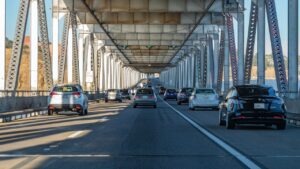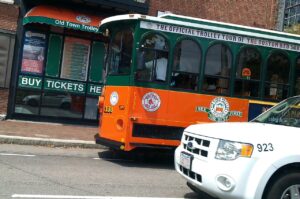 From heavy traffic to winter snowstorms, the road conditions in Boston, MA, make it a wonderful city for walking and a tricky one for driving. Challenging road conditions can lead to automobile accidents, which cost you time and money. The first step in preventing collisions, property damage and injuries is maintaining awareness of potential hazards and how to avoid them when you’re behind the wheel. If you are involved in an accident, then Jason Stone Injury Lawyers will fight for the justice you deserve.
From heavy traffic to winter snowstorms, the road conditions in Boston, MA, make it a wonderful city for walking and a tricky one for driving. Challenging road conditions can lead to automobile accidents, which cost you time and money. The first step in preventing collisions, property damage and injuries is maintaining awareness of potential hazards and how to avoid them when you’re behind the wheel. If you are involved in an accident, then Jason Stone Injury Lawyers will fight for the justice you deserve.
What Road Conditions To Expect in Boston, MA
Although ranked near the bottom of the list of worst U.S. cities for drivers, Boston’s reputation as a “walking city” is well-earned. Tourists love wandering through the city on cobblestone and brick paths, admiring centuries-old buildings teeming with American history and artifacts. Drivers, on the other hand, are forced to navigate a maze of roads that seem, at times, arbitrarily organized and always jammed with other cars.
Complex Street Layout
Although folk legend attributes the street layout to builders simply paving over old cow paths, it results from several historical factors. For instance, the city proper is several old towns that merged over time, built over varied topography and bounded by water on one side. Regardless of the origin of the unusual structure of the city streets, the sometimes confusing and convoluted street grid increases overall congestion. Large numbers of pedestrians, both locals and tourists, also constitute a hazard, as drivers must attend to many people on foot on sidewalks and in roadways.
Heavy Annual Precipitation
Then, there’s the weather. The average precipitation in Boston is 47.4 inches of rain and 48.1 inches of snow, significantly higher than in many other metropolitan areas. Precipitation in any form dramatically elevates the risk for drivers as roads become slick and visibility decreases. Rain is particularly dangerous in the first few minutes, as the water mixes with oils and chemicals on the road to create a slipper surface. Snow, of course, is inherently slick, and even plowed roads pose a risk of black ice. The higher precipitation averages in Boston mean increased care behind the wheel is critical for your safety.
Ongoing Road Improvements
Don’t forget that Boston is a city perpetually growing and improving. Even though it’s one of the most historical cities in the country, Boston is also booming into the future, with a population projected to grow 15% to 17% in the next decade. More people means more trips into the city, and personal vehicles increase both gridlock and the potential for vehicular accidents. City planners are working to alleviate the future safety concerns caused by large numbers of cars on the road, but the addition of construction zones causes headaches in the present.
How To Handle Less-Than-Ideal Road Conditions
Even the most skilled drivers must exercise care in intrinsically hazardous road conditions. While apparent dangers, such as objects in the roadway or erratic drivers, require close attention and immediate action, the more subtle nature of the following road hazards means they deserve an extra look.
Slippery Surfaces
Many fatal accidents are caused by excessive speed, and the Fatality Analysis Reporting System reports that 25% of large-truck fatalities resulted from a combination of speed and adverse weather. When traveling on wet roads, reduce your driving speed by at least 1/3. If the road is snow-packed, as it often is during a Boston winter, reduce your speed by 1/2 or more. For instance, if the posted speed limit is 30 m.p.h., drive only 20 m.p.h when it’s raining and 15 m.p.h. in the snow. If the road is icy, drive extremely slowly and pull off if you cannot control your vehicle.
Poor Visibility
Aside from the obvious visibility problems caused by precipitation, reduced visibility is also caused by the sun’s position, darkness and fog. Common in the fall and winter months, fog poses a risk for drivers because it reduces your visibility and also makes it seem like you’re traveling at a slower speed than you actually are. Darkness presents similar problems so the following safe driving tips can apply to both situations:
- Watch your speed and drive only as fast as you can safely see ahead.
- Use your low-beam headlights.
- Don’t use high-beam headlights in fog: they’ll reflect light into your eyes.
- Use your defrosters and windshield wipers to keep windows clear.
- Turn on your signaling lights earlier than usual and increase your own following distance.
Construction and Heavy Traffic
It’s a given: no one likes sitting in traffic, whether the jam results from construction work or a collision up ahead. Even though vehicles move slowly when things are gridlocked, adhering to a few basic techniques make the experience less frustrating and less dangerous:
- Stay calm: Don’t lose your patience! Losing your cool in traffic can lead to aggressive or erratic driving, which endangers you and the other drivers.
- Attend to following distance: No matter the current traffic speed, keep a three-second following distance between you and the car in front. Watch for brake lights, too, keeping the same distance as you slow down.
- Use turn indicators: Weaving rapidly in and out of traffic lanes is dangerous because it’s unpredictable, and changing lanes without using your turn signals represents the same issue for other drivers.
Who To Call When Road Conditions Lead To an Accident
Your safety and health are paramount when you’ve been involved in an automobile accident. Once you’re in a secure place and ready to deal with the physical aftermath of the accident, it’s time to start dealing with insurance companies and medical bills. At Jason Stone Injury Lawyers, the Stone Cold Guarantee means that when you contact us, There’s No Obligation, Just Information (R), and we don’t get paid until we settle your case. We know that the financial burden placed on personal injury victims can be immense, and to alleviate that burden, Jason Stone Injury Lawyers require no upfront fee to get started on your case. The team at Jason Stone Injury Lawyers” is ready and available to assist you with your claim, so call us today at 800.577.5188.
Not Trusting What You’re Being Told?
Better Phone Stone
800-577-5188
 START MY NO OBLIGATION CONSULTATION
START MY NO OBLIGATION CONSULTATION











